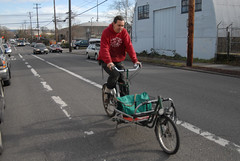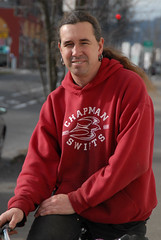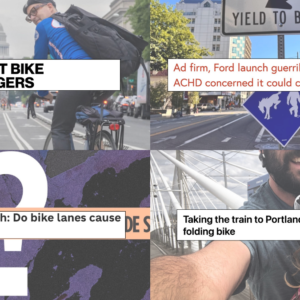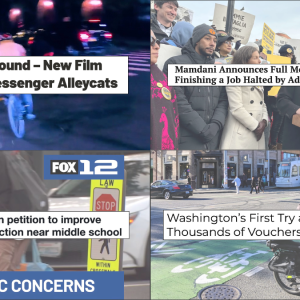[Welcome to Part Two of our three-part series on bike messengers in Portland.
This series is written by BikePortland contributing writer Erin Greeson (bio). In Part One, Greeson laid out the tough working conditions faced by Portland’s messengers. In the article below, she shares finding health care coverage for a messenger who’s also a mom and she delves into the impact of the messenger stereotype.]
“To some people, the idea of bike messenger work is about ultimate freedom…but perhaps some degree of stability is what workers really need.”
— Meghan Mack, messenger and mom
As millions of Americans can attest, life without health care is stressful and dangerous for both individuals and families.
Meghan Mack is a Portland bike messenger and mother who found that her wages could not cover the cost of crucial family care. Meghan was determined to obtain health coverage for her child and herself and fought hard to find a solution.
“It takes a lot to find the aid that you need,” she said, citing the complexities of paperwork, deadlines and spiraling webs of bureaucracy. Meghan and her child qualified for Oregon Health Plan coverage for a period of time, but the coverage eventually terminated. Looking for other options, she investigated and found out about the Family Health Insurance Assistance Plan (FHIAP).
Hopeful about the FHIAP, Meghan shared the information with her messenger colleagues. Her friend Dee Branham managed to secure a place on the FHIAP waiting list, but he was told that the list would remain immobile for an undetermined time period, due to overwhelming public need.
“To some people, the idea of bike messenger work is about ultimate freedom,” Meghan said, “But perhaps some degree of stability is what workers really need.” Meghan is but one of several Portland messengers who work not as individuals, but as parents who make family the priority.
In addition to difficult working conditions, bike messengers often confront stereotypes based on generalized public perceptions. Just as some bike commuters get frustrated when others run red lights for fear that it might give everyone a bad name, bike messengers face what appears to be a universal dilemma: a few messengers conspicuously disobey traffic laws, and the general public tends to apply the stereotype to all.
“Most of us don’t run red lights,” Gideon Telford explained. “Most of us stop!”
“The greatest challenge that I face is overcoming the stereotype of the bike messenger as unskilled labor; as a young, irresponsible, wanton law-breaking hooligan of the streets. I view myself as a tradesperson, and I am very proud of my capabilities.”
— Joel Metz, bicycle messenger
As I got to know several messengers through my work at a downtown business, I found myself repeatedly defending them when people would complain of rude riding or their “attitudes.” I understand public frustration toward instances of disrespect on the road, but the broadly applied stereotypes did not reflect the work style of Telford and other messengers who I had come to know.
For example, Joel Metz is a distinctive leader in the Portland bike messenger community. His long ponytail, front-loader cargo bike and kind demeanor are hard to miss. Metz shared some personal insights about negative misconceptions that impact his life.
“The greatest challenge that I face is overcoming the stereotype of the bike messenger as unskilled labor, as a young, irresponsible, wanton law-breaking hooligan of the streets,” Metz explained, “I view myself as a tradesperson, and I am very proud of my capabilities as a messenger.”
Through his years of hard work, Metz accumulated enough savings to purchase a home. Metz noted that he makes health insurance a priority because of its inherent link to his ability to come up with a mortgage payment.
After all, he explained, “An unexpected injury or unexpected health care costs could jeopardize my status as a homeowner.”
— In the final installment, Part Three (now published), we’ll end on a more positive note with a look at ways messengers can organize to support themselves and the future of their profession.










Thanks for reading.
BikePortland has served this community with independent community journalism since 2005. We rely on subscriptions from readers like you to survive. Your financial support is vital in keeping this valuable resource alive and well.
Please subscribe today to strengthen and expand our work.
One thing that was just occurring to me, is that it seems like for bike messengers, the benefits of having separated bicycle infrastructure would be enormous – if they could make a large part of their trips around the city without being mixed in with automobile traffic, it seems like both the public perception of them and their level of safety would change dramatically.
While I don’t condone cyclists breaking traffic rules, I realize that it is for their own safety (or at least their perception of their own safety) sometimes, and I believe that having separated infrastructure would simply make it easier for everyone involved to obey traffic laws and feel safe (not to mention, less frustrated with each other).
I think it would also have the effect of shaping the view of bicycles in general (messengers and otherwise) as valid traffic. I think a lot of folks driving on the roads still look at people riding bicycles as a nuisance, and to some degree, that’s understandable. Anyway, I think the perception is, the roads were built for cars, so cars are the valid traffic. I think as we start to build infrastructure for bikes, that will start to change.
So, roads are for cars, which means bikes aren’t valid “traffic”… so instead of validating cyclist’s rights to the road, we’ll perpetuate the idea that they don’t belong there by forcing them onto bike trails?
I’m not saying bikes don’t belong on the roads, I’m saying I think people have that perception.
Also, why wouldn’t you want to be separated from automobile traffic? I certainly do as a daily bike commuter. I think my rides would be much more pleasant that way.
Unless the idea of separated infrastructure for bicycles involves elevated tracks, a subterranean network of tunnels, or some magical wormholes, I don’t see how it helps get bikes out of dealing with traffic signals and interacting with cars. Thats’ why I’m sceptical that it will help with either safety or motorists’ perception of cyclists.
It doesn’t work that way, Dave. Messengers deliver to specific addresses, all of downtown would have to be bike-only. Hmmm… not a bad idea.
I don’t mind most auto traffic. I rode a motorcycle too, so to me it makes sense to be out there among the cars and trucks, although on a bicycle you are underpowered.
All of downtown wouldn’t need to be car-free (though I wouldn’t complain about that either), they would just need to have separated bike tracks through most of downtown, which I think would be do-able if they really wanted, the lanes in most places are huge. And around the rest of the city, having that kind of infrastructure in place might at least make large chunks of messengers’ trips nicer (for instance, going between neighborhoods or sections of town).
Ever seen pictures of mail carriers in Copenhagen on bikes with 4 enormous panniers on the bike riding along the cycle tracks? They deliver to individual addresses, there just happen to be cycle tracks that allow them to do so.
@Peejay – the idea with most cycle tracks in Europe is that they are physically separated from car lanes by being elevated or by pylons or curbs or something that would keep a car from driving into it. Often at traffic signals, the cyclists have a separate light that turns before the automobile signal does, so the cyclists have time to cross the intersection, car-free.
I think in terms of perception, if the city invested in infrastructure that supported bicycles as transportation, it would confirm in peoples’ minds that they are in fact supposed to be out there on the roads or tracks and that they aren’t just people going for a stroll and getting in everyone’s way.
Social Healthcare?
Separated and elevated bikeways?
Sounds expensive…Makes one wonder how we could pay for stuff like that. We’d probably have to give up funding illegal foreign wars.
…and let’s hope we’re moving in that direction 🙂
Why not just work to educate motorists and bicyclists to coexist on the road? It uses the existing infrastructure.
Even with cycle tracks there are intersections with motorized traffic, and most collisions occur at intersections.
I think the biggest reason is subjective safety – most, or at least many, people will feel safer riding a bike if they aren’t in amongst car traffic. Generally it’s been shown to shoot up numbers of people using bikes for short trips.
Education is fantastic too, I think that really needs to happen as well.
Jonathan:
Any chance you can change the picture that’s posted with this article on the front page? The article superficially looks just like the one posted yesterday, at first I just assumed that you hadn’t updated today, I’m guessing others might make the same mistake.
cyclist (#12),
great suggestion. i have made some edits to the format that should clear up the confusion. thanks.
I’m glad the stereotype of illegal and dangerous behavior was addresssed. I’m sure it is the exception, but unfortunately it is those exceptions that stand out, to both motorists and other cyclists. Hence the stereotype.
If cost of health care is such a concern, one would hope people would understand the correlation between injury rate and dangerous behavior such as weaving in and out of traffic and blowing stops at high speed.
And finally, if we expect bus drivers and truck drivers to act as professionals and set an example for other motorists, we should expect bike messengers to be the professionals setting an example for other cyclists.
It is understandably difficult given the relationship between speed of delivery and compensation. Truck drivers often have a similar dilemma, but the difference is they generally get paid enough to behave appropriately and still make a living wage.
Yes, working as a messenger sucks, but it is a commodity service. There is nothing beyond price which can differentiate a messengering service beyond basic competence. Lower prices lead to lower wages, this is the downward pressure on prices that commodity economics causes.
Things such as e-file will continue to erode messenger services even more, so it just looks like it’s a bad business to be in.
I’ve ridden in copenhagen…It is boring and everyone goes slow.You have to use a multi use “cross walk” to make left hand turns and I saw plenty of bike messengers avoid even using these raised bike paths. point in case the bike paths seemed very inefficient for messenger work.
I could be totally wrong but that’s what I experienced just by watching.
oh and to add to the other frustations of these copenhagen bike paths other delivery vehicles use it as a temporary parking spot.
just another observation to consider
yeti core is that you?
As an employer of the finest of the bike messengers in this town please take notice. My people on bikes are paid a fair wage and bonuses for their effort. They have workmans comp and are expected to come to the job free of drugs and alcohol which is expected of any employee of any company. It is the wannabes and so called independents that muck the works. Megan and Hazel are experienced and professional about their business and should be held up as examples of quailty independent couriers. Unfortunaly they are surrounded by those who avoid safety issues, labor laws, tax filings and anything the rest of us have to follow or pay for. Have no sympathy for those bikers as they have no place in our market
I sympathize with people whose profession denies them access to affordable health care. But I’m also very worried that in an article that stresses health care there are several pictures of messengers riding around without helmets!!
Nice to see Gideon mentioned here. I worked with him at P.I. and others. Don’t you have a floor to sweep or a dog to calm down because of skateboards? I’m surprised Heather allowed you the extra time on the job to comment for this story. Good luck and tell Peaches to eat it, waggle waggle.
@ Dave:
So, rather than simply make people realize (through cheap education efforts) that bikes are legitimate traffic and respect our right to space on the road, you’d have the government spend (probably) millions of dollars on new, separated and inefficient infrastructure?
That just doesn’t sound like a good solution.
Dave (#3) asked “why wouldn’t you want to be separated from automobile traffic” – In a word, access. A separated infrastructure will almost never have the same level of access as the existing road network, and access is the key factor for messsengers – in order to maximize the number of deliveries, you have to have easy access to any potential destination – and the road network is going to provide a shorter path (distance and time-wise) in most cases than any separated infrastructure, especially when signals are involved. Signals are generally prioritized for motorized traffic, not bikes and peds. (There are exceptions)
dave #3:
separated bike infrastructure is kind of a nightmare for messenger work – in amsterdam and copenhagen (ive ridden extensively in both cities) and other cities where it is prevalent most bike messengers keep away from it – bike traffic bogs us down, and cars are easier to slip through.
schrauf #14:
i dont buy the “a few bad messengers ruin it for the rest of cyclists” (or even for themselves) angle, especially here in portland. there are perhaps a mere 35 of us on the road on any given day, and how many other cyclists, legions of whom wear messenger bags, ride fixed gears, and otherwise are easily mistaken for messengers? far be it from me to claim total innocence and absolute law-abiding behavior on our part, but its far more plausible that other cyclists are mistaken for messengers, and we get the blame.
traffic laws are broken by messengers, this is incontrovertibly true. but after a decade and a half in this industry, and experience riding in *dozens* of cities worldwide, ive come to believe that messengers are hardly more guilty of this than the general cycling public.
Same sh*t, different year. While this may be news worthy it certainly is not new. I can think of at least two “worker owned” messenger services that started in the early/mid nineties. Where are they now?
oh and brent #19:
who are the independents you are accusing of “avoid[ing] safety issues, labor laws, tax filings and anything the rest of us have to follow or pay for.”? im pretty familiar with the indies out there, and im unaware of any who fit this bill.
im also curious about your fair wage, and this bonus structure.
What *magical* infrastructure are you going to come up with where bikes/car are actual separate?
A side-path? You mean that thing where there are conflicts at every intersection? Not separate.
A trail? How much private property are you going to condemn to build an entirely separate road system complete with underpasses and overpasses at every intersection to keep bikes/cars separate?
Last week my neighbor complained to me about “all those bicyclists breaking traffic laws”. I told him that the last time I was motoring down the Banfield Freeway doing (the posted) 55mph, EVERY OTHER CAR was speeding by me. Some blowing by like I was standing still. All those scofflaw motorists? He understood, and immediately changed the subject.
Try it next time you get accused of being a scofflaw; it works.
Here’s some history:
[In 1978, it took the biggest step of all and banned passenger cars entirely from a 12-block stretch of the two main downtown thoroughfares – Fifth and Sixth Streets, forcing residents to take public transportation.
”The pedestrian is critical to Portland,” said William Wyatt, the head of the progrowth business group, Association for Portland Progress. ”We discourage sky bridges because they take people off the street. We discourage blank walls. We discourage traffic. All of this is now paying off.”] Excerpt from NYT article By Timothy Egan: May 31, 1987
its nice you only talked to all the media friendly “PC” messenger…
n #30:
erin put it out there far and wide that she was looking for messengers to talk to for this article. if she didnt talk to you, its as much on you as it is on her. you cant interview messengers who wont be interviewed…
randy #29:
too bad they didnt stick by that! of course, that nyt article couldnt possibly know that 20 years later, that ban on cars was totally rescinded in a mall redesign that *could* have been a big step forward. im not looking forward to 2 of the most useful streets in downtown (for bike messenger work – there are TONS of clients on 5th and 6th) becoming frustratingly awkward – banned from the right 2/3 of the road, clogged up on the left 1/3. i think we all know whats going to happen, and im perhaps hoping we messengers can sit down and talk with trimet beforehand to possibly temper the effect of the inevitable.
As Brent #19 mentions, not every messenger company employs a pure commission system. I worked for Rose City Delivery around the millennium, and was paid a base wage plus a minor commission per item. The commission system is pernicious not just because one competes against co-workers, but also because it encourages breaking traffic laws to eke out a few more deliveries in a day. I encourage anyone who hires couriers to choose one that pays its bike messengers a base wage.
I agree that completely separate paths are not a solution, but I do think that infrastructure changes are at least part of the solution. Decades of design knowledge has gone into designing roads to optimize car traffic. Drivers should be educated, but the bottom line is that the system is not designed for mixed traffic. I’ve never found a route through Portland that doesn’t have at least few sketchy spots. And, its funny how the bike friendly additions just disappear when they become inconvenient, like in the roundabout on Glisan and 39th.
Also, reading the discussion, I’m seeing that if proper infrastructure is developed (like in copenhagen) bike messengers don’t want to deal with bike traffic and they prefer weave through cars. Am I reading this right? It feels like there’s no solution that will satisfy.
I think a mixed solution would be great – re-work the roads so they are more bike-friendly, for folks like messengers who are needing to go to individual addresses all over and for whom it would be inconvenient to be trapped in a separated path all the time, and put in some number of separated paths for simple commuters going to work or the store or the movies or whatever, so that they can get where they’re going without being mixed into car traffic. Educate *everyone* both on how to safely ride a bike with cars, and how to safely drive with bikes.
I agree with Abbey that the infrastructure we have was designed specifically and exclusively to accommodate automobiles (which is why I noted that the perception of the public follows suit), and that really infrastructure redesign to *some* extent is really important, both from the standpoint of physically accommodating bikes and pedestrians more, and changing public perception of who is supposed to be on the roads.
It’s always disconcerting to have a bike lane suddenly end without warning, and all of a sudden you’re unintentionally cutting off speeding cars who are honking at you and zooming around you – that kind of design just causes more problems than anything, for everyone on the road.
403 #32:
it wouldnt surprise me if a “base wage” most places is purely symbolic – im not sure of oregons laws, but i dont doubt that even commission-based workers are required to be paid minimum wage (should they not earn minimum wage for their days work purely on commission alone) – which is pretty much what base wage is most of the time. so in the end, its really 6 of one, or half-dozen of the other, maybe with a little sugar (bonuses, incidental commission) on top.
whether or not all companies are paying minimum wage to their commissioned riders, even on days when their commission works out to be less than minimum wage, well… lets say that given ample prior experience with companies around the county, id guess they probably arent.
Hey folks… i published the final part of this series.
Read it here
thanks.